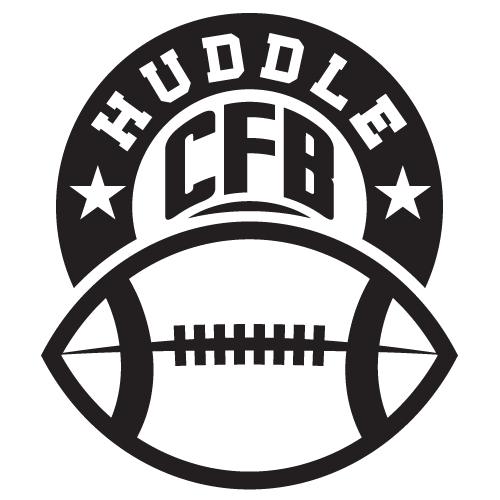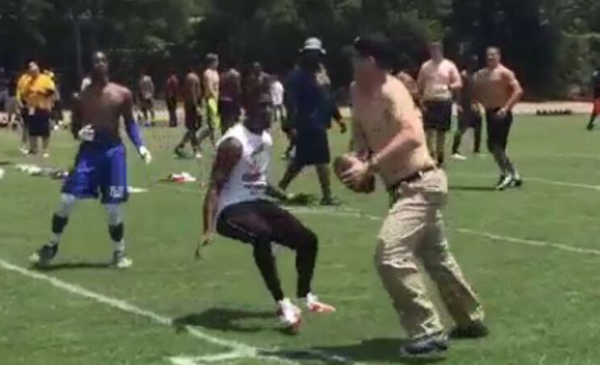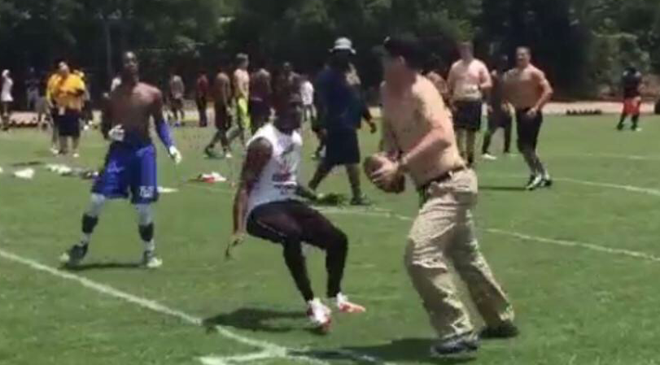The NCAA-ratified satellite camp ban, announced Friday, hurts college football’s programs that stand to benefit the most.
Jim Harbaugh may have to wear his shirt more as a result of the satellite camp ban, but Michigan will soldier on. Harbaugh’s NFL resume and unorthodox yet winning ways combine with the Wolverines’ historical prominence to ensure Michigan stability on the recruiting trail.
Nebraska and Penn State coaches don’t need physical presences in Southern camps to make the names Cornhuskers and Nittany Lions known, though the personal interaction afforded by such opportunities doesn’t hurt.
Support for the satellite camp ban grew from the never-ending quest for competitive edge among the sport’s power brokers.
“It is clear to me the NCAA made the decision based on a few power five conferences that are clearly opposed to these camps,” Old Dominion head coach Bobby Wilder responded in an email.
Georgia State head coach Trent Miles hosted such coaches as Penn State’s James Franklin. For Miles, the shuttering of these camps underscores that the real collateral damage in this Power Five gamesmanship are the high school attendees.
“It’s very disappointing for the student-athletes who can’t afford to travel out of state to be seen by coaches and schools from other regions,” Miles said in an email. “Like the young man from Atlanta who would like to be seen by a Big Ten school but can’t afford to travel there. Now he doesn’t have that opportunity.”
Wilder, whose camps also hosted Penn State, expressed similar sentiment.
“I feel strongly these camps are a benefit to all the high school kids that cannot afford to travel individually to the schools they hope to attend due to the cost restraints on individual families,” he said.
Recruiting at this juncture of the 21st century changed dramatically. More prospects have access to more football programs than ever before, thanks to the proliferation of the internet and various recruiting services like Hudl.
However, that’s just one piece in a much larger puzzle. Impressing online has its value, but face-to-face interaction is a rare commodity.
Prospects are limited in the number of visits they can take, and financial constraints further complicate the process for some.
“I recently spoke with Todd Berry, [American Football Coaches Association] President about the issue. I explained that in June of 2015 we ran our first ever camp with Penn State and attracted nearly 1000 kids,” Wilder explained. “We had over 40 schools represented from all divisions of college football. Every camper had the opportunity to visit with each school. Instead of making 40 individual trips to each school, they made one trip to be in front of 40 schools. The camps at Old Dominion are not just for the best players that attend. They are for every player that attends.”
“Every player” extends to the unheralded gems trying to make a name, all the way to the cream of the recruiting crop. No reaction better illustrates this than that of 5-star prospect Donovan Peoples-Jones.
Local to Big Ten Country, and carrying that rare 5-star distinction, Peoples-Jones doesn’t need a satellite camp to be discovered. But his impassioned tweet spoke not for those blue chips such as himself, but his peers.
Retweet to spread this: #ChangeNCAA pic.twitter.com/HDimVUW9HE
— Donovan P. Jones (@dpeoplesjones) April 10, 2016
The negative impact this ban has on prospects has been well-established via outlets other than CFB Huddle. Garnering less attention, the programs that hosted coaches like Harbaugh and Franklin provide further collateral damage.
Disappointed to read satellite camp news-better solutions than a ban- will hurt PSA’s & Group of 5 schools. pic.twitter.com/fhmEDnn2ve
— Pat Fitzgerald (@coachfitz51) April 8, 2016
The name-brand recognition inherent with programs like Penn State and Michigan gave a rub to such hosts as Georgia State and Old Dominion. As Wilder mentioned in his reply, Old Dominion attracted nearly 1,000 campers.
The university followed up on the success of its 2015 camps with plans to host Penn State, Michigan and Maryland in 2016.
“We will file a waiver through our compliance department with the NCAA for this summer,” Wilder explained. “I am hopeful they will grant the waiver to allow all the kids that have made plans to attend.”
Michigan, Penn State and Nebraska are all established. Georgia State and Old Dominion are not. Their football programs launched in 2010 and 2009.
These camps provided exposure to and for recruits to fledgling teams, trying to build their name. Sharing the national stage with a Michigan, a Penn State, a Nebraska often entails taking a paycheck and losing an early-season game by a handful of touchdowns.
The satellite camp ban denies these programs from sharing a platform with the sport’s power brokers as equals.
However, a confounding element to the satellite camp ban: six of 10 Football Bowl Subdivision conferences voted in favor of it. That includes Group of Five conferences with members that stood to gain from the camps.
The SEC’s coaches generated much of the headlines against satellite camps, with Alabama’s Nick Saban most famously lamenting the imbalance of playing field these camps created.
The SEC often sets the narrative for the sport as a whole, but the conference cannot shoulder all the blame for the satellite camp ban. The ACC followed suit to prevent Big Ten counterparts from encroaching on Southern territory, but the Big 12 and Pac-12 also voted to ban. The Mountain West and Sun Belt group rank from the Group of Five and joined with the Power Five majority.
As a conference, the Sun Belt defied the measures of at least one member, Georgia State, working to get better. But even the league’s recent benchmark for success, Arkansas State, expressed public displeasure with the measure.
I asked Blake Anderson tonight about the NCAA banning satellite camps. He, as expected, did not agree with the ruling.
— Troy Schulte (@TroySchulteADG) April 9, 2016
The Mountain West’s preeminent program, Boise State, actively participated in satellite camps. I asked Broncos head coach Bryan Harsin his stance on the camps last summer.
“You get to be there. You get to have your face there, and your staff gets to be out there coaching,” he said. “I think that’s the one thing – everybody talks about satellite camps from a recruiting standpoint. I get that.
I also think that, at least in our program, that’s one of the things we get out of it,” he continued. “But we’re also out there coaching and showing how we coach and helping these kids learn the way we teach our guys. To me, that’s not just showing our faces. That guy learned something, and he’s a better football player because of Boise State? That’s as big as anything.”
And it worked both for program and athlete.
That’s how I got Boise State and how you can expose yourself to college coaches without paying expenses. Stupid https://t.co/dFDzAVODH8
— ❄Deandre Pierce❄ (@its_rayray4) April 8, 2016
For all the talk of satellite camps fitting onto a “level playing field,” this ban is anything but for Group of Five programs and recruits alike.




[…] Satellite Camp Ban Hurts Recruits and Programs […]